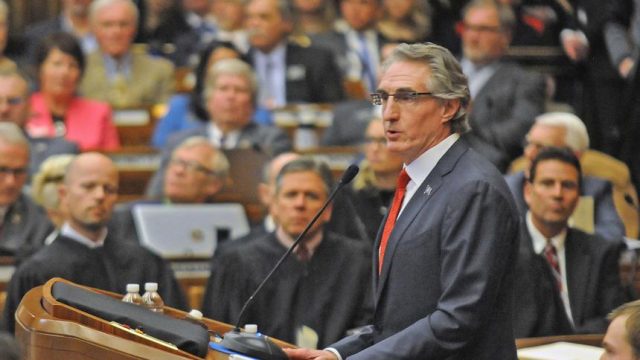Governor Burgum May Be Salty About It, but Lawmakers Are Right to Sue Over Vetoes

TOM STROMME.Tribune Governor Doug Burgum opened North Dakota's 65th legislative assembly on Tuesday afternoon in front of a joint session of the legislature where he delivered the State of the State address. Gov. Burgum touched on a number of topics in the address but a continuing theme was lifelong education. "Learning begins with humility. Everyone has something to teach us," he said.
State lawmakers announced today that they’ll be filing a lawsuit challenging some of the vetoes issued by Governor Doug Burgum targeting bills they passed during their session earlier this year.
We knew this was coming. Senate Majority Leader Rich Wardner told me back in June that lawmakers needed just one more vote to move forward with a legal action, adding that Burgum had engaged in “selective deletion.”
But Burgum, in a press release, said the lawsuit isn’t “a prudent use of taxpayer dollars.”
“As I’ve stated before, the intent of these vetoes was to protect executive branch authority, preserve the separation of powers and prevent spending of scarce state resources without full legislative review,” Burgum said. “While we don’t believe this lawsuit to be a prudent use of taxpayer dollars, we will respond accordingly to any legal action that attempts to infringe on executive branch authority. In the meantime, we remain squarely focused on reinventing government and being as efficient as possible with taxpayer dollars as we carry out the duties of the executive branch.”
I’m not sure I agree with Burgum. Whatever the outcome of this case, it’s almost always a prudent use of taxpayer dollars for one branch of government to defend its authority against another branch. Just as Burgum talks about protecting executive branch authority, it is incumbent upon lawmakers to protect their authority.
[mks_pullquote align=”right” width=”300″ size=”24″ bg_color=”#ffffff” txt_color=”#000000″]…if the Governor can modify appropriations bills by removing how lawmakers determined the money should be spent, then what is the point of the Legislature even budgeting in the first place?[/mks_pullquote]
And by the way, as I wrote in June, the lawmakers have a good case.
The state constitution gives our governor two tiers of veto authority. Burgum can veto any given piece of legislation outright, sending it back to the Legislature for a possible override vote. But when it comes to appropriations bills, Burgum can also deploy a line item veto, taking out parts of a given bill without necessarily rejecting it in its entirety.
There is a limit to that latter authority created by the North Dakota Supreme Court in a 1979 case called Link v. Olson.
That case involved former Governor Art Link vetoing a portion of an appropriation bill which created a new executive branch office under the Lt. Governor, then using an executive order to move the duties of that new office to his own office.
He funded that move with the appropriation provided by the Legislature for the original office.
Opponents of this move argued that Link hadn’t vetoed the legislation but had rather altered it.
Altering the law is what the legislators do. The executive branch can veto but cannot legislate.
Link lost the case. The governor “may not veto conditions or restrictions on appropriations without vetoing the appropriation itself,” the ND Supreme Court ruled.
Yet that seems to be exactly what Burgum did. Here’s an example of what the lawmakers will be challenging.
Senate Bill 2003, the university system budget, as passed by the Legislature contained a section which requires that new building projects conform to space utilization plans. The intent was to check some of the unnecessary camps expansion which has taken place in recent year.
Burgum vetoed that restriction, but left in place the appropriation. A seemingly clear violation of the Supreme Court’s interpretation of veto powers.
In fact, if the Governor can modify appropriations bills by removing how lawmakers determined the money should be spent, then what is the point of the Legislature even budgeting in the first place? Any governor, from Burgum forward, could simply veto all legislative intent and leave the executive branch free to spend money as they please.
I don’t think that’s an outcome anyone wants.




